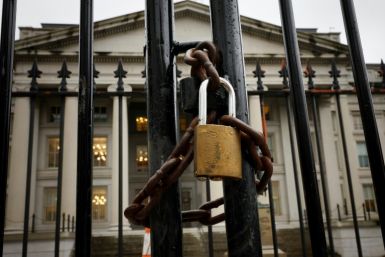Miran, currently serving as chairman of the White House Council of Economic Advisers, has pledged to take an unpaid leave of absence from his White House role if confirmed to the Fed, according to PBS NewsHour.
According to the National Federation of Independent Business (NFIB), small business owners are cautiously optimistic, but high employee turnover and skill gaps continue to weigh on confidence, suggesting that workforce issues remain a central hurdle for economic growth.
A new survey by the American Chamber of Commerce in Shanghai shows only 41% of U.S. companies are optimistic about their five-year outlook in China—the lowest reading since the survey began in 1999.
The SEC is sharpening enforcement against auditors, underwriters and advisers accused of enabling speculative micro-cap listings, warning that geographic distance will not shield bad actors from U.S. oversight.
The benchmark revision slashed employment gains by nearly one million, suggesting that hiring had been far weaker than policymakers, investors and businesses previously believed.
In this list, we are thus showcasing some of the most trusted, fast, and resourceful dropshipping platforms in North America.
Unlike structured notes or defined-outcome products, which often cap returns in exchange for loss protection, SynthEquity® accepts the risk of total loss in the options sleeve in exchange for uncapped performance at a portfolio level.
When it comes to mergers and acquisitions, one problem is repeated so often it has become background noise: overpromising. That's where Clarity1 comes in. Founded in 1994 by Richard Sheiman, Clarity1 has built a 31-year reputation on a simple but radical premise: transparency first.
How to avoid missing out on promising positions in an algorithm-driven world, where to find your place in the evolving tech landscape, and how to turn AI to your advantage—all of this is explained by Anna Gagarina, career development expert, founder of Job Mentor, an AI platform for career guidance.
The ADP National Employment Report, released Thursday, showed private employers added just 54,000 jobs in August, well below expectations of 65,000 and down from 106,000 in July.
Personal debt pressures are weighing on household confidence, with fewer Americans reporting financial well-being despite optimism about the longer-term outlook.
Beijing's decision to allow the yuan to appreciate, after months of weakness, signals a diplomatic overture to Washington while also shoring up confidence at home.
U.S. long-term yields briefly touched 5% for the first time since July, fueling fiscal concerns and mirroring bond market turbulence in Japan, the U.K., and Europe as investors demand higher returns on government debt.
Under Section 179 of the 2017 Tax Cuts and Jobs Act, business owners who utilize a qualifying asset for more than 50% of business purposes may deduct its cost in the first year.
The problem at issue in Marx's reflections on variations between pre-bourgeois forms of communal ownership (Indian, Slavonic, Mediterranean, and Germanic) was the genesis of the defining social relations of modern bourgeois society out of a separation of the laborer from the means of labor- the opposition of capital to a dispossessed but formally free labor force.
U.S. stock futures gained on Labor Day after a federal court ruling against most Trump-era tariffs, even as a new survey showed American businesses remain deeply tied to China despite trade tensions.
Fed funds futures now imply an 85 to 90 percent chance of a 25-basis-point reduction at the Sept. 16–17 policy meeting, up from roughly 75 percent before Powell's speech.
Beneath every iconic skyline lies a deeper truth: the invisible world of soil, pressure, and innovation. And at the center of this world is Dr. Reza Zahedi—an engineer, entrepreneur, and global executive who is reshaping how cities rise.
The higher cap in the Big Beautiful Bill looks like good news, Ross Atefi, founder of Yatra Wealth Design, warns that for high earners, it's a double-edged sword.
The bill would raise the child tax credit from $2,000 to $3,000 per child and broaden deductions for health insurance premiums and medical expenses.
Moody's Analytics chief economist Mark Zandi said over 53 percent of industries tracked in the government's payroll survey shed workers last month.
Buying diamonds online frequently leads to doubts about authenticity, fair pricing, and overall trustworthiness. Rare Carat addresses these issues by offering the ease of online shopping with personalized, trustworthy expert advice.
The Property & Casualty (P&C) insurance industry is undergoing a seismic shift as insurers move away from outdated legacy systems toward modern, scalable, and intelligent data architectures. At the heart of this transformation is Muthukumar Murugan.
The Property & Casualty (P&C) insurance industry is undergoing a massive digital transformation, driven by the need for real-time data processing, predictive analytics, and seamless integration across multiple platforms. At the forefront of this revolution is Muthukumar Murugan.
Experts warn that such aggressive tariff policies risk damaging decades of diplomatic progress between the U.S. and important emerging markets.
The Dow Jones Industrial Average rose by 0.75%, the S&P 500 gained 0.85%, and the Nasdaq Composite jumped 1.3%, marking one of the strongest sessions since late July.
The company is collaborating with Corning Inc. to manufacture 100% of the cover glass for its devices at Corning's facility in Harrodsburg, Kentucky, a $2.5 billion project marking the first time all Apple device cover glass will be produced domestically.
While the White House frames these measures as a bold move to protect U.S. industries and jobs, economists warn that the costs will be borne largely by households, fueling inflation and straining budgets.
The global payments industry is undergoing a massive transformation, driven by the need for faster, cheaper, and more secure cross-border transactions. At the forefront of this revolution is Sahaya Bertilla Selvi.
The Capital Market industry is undergoing a digital transformation, with fintech innovators leveraging cutting-edge technologies to enhance user experience, accessibility, and efficiency. Among these innovators is Sahaya Bertilla Selvi Joseph Augustine.



















































